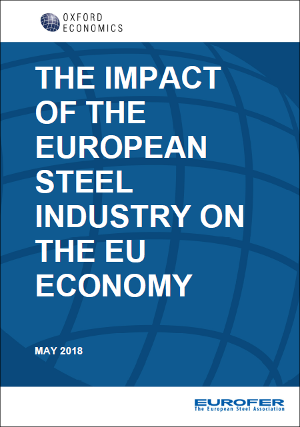Ungated Post | 02 May 2018
The impact of the European steel industry on the EU economy

Steel manufacturers have a significant presence in 22 of the 28 EU countries, directly employing 320,000 workers and making a €20.7 contribution to GDP. But much more significantly, they purchase €103 billion worth of supplies from other industries, supporting a large amount of ‘indirect’ GDP and jobs in their EU-based supply chain. Taking into account activity ‘induced’ by the wage-funded spending of those working in the industry and in its supply chain too, some 2.5 million jobs are supported in total through the direct, indirect and induced channels of economic impact. This generates €128 billion of GDP across the EU-28, which is more than the GDP of the state of Berlin. The so-called ‘multipliers’ for GDP and jobs – the ratios of total activity to direct activity alone – are therefore unusually high, at 6.2 and 7.7 respectively.
Oxford Economics’ team is expert at applying advanced economic tools that provide valuable insights into today’s most pressing business, financial, and policy issues.
To find out more about our capabilities, contact:
Americas
Diantha Redd
+1 (646) 503 3052
Email
Asia Pacific
Peter Suomi
+65 6850 0110
Email
EMEA
Aoife Pearson
+44 (0)203 910 8054
Email
Related Services

Post
The economic impact of abandoning the WTO
Oxford Economics have been commissioned by the International Chamber of Commerce (ICC) to provide an independent assessment of the economic impact of WTO dissolution. This report details our findings and the assumptions underpinning our analysis.
Find Out More
Post
The economic impact of the sports activities of public service media
This study shows how the sports activities of public service media supported €4.5 billion of GDP and 57,000 jobs across 31 European countries in 2022, taking direct, indirect (supply chain), and induced (wage-funded expenditure) impacts into account. The report also highlights wider economic benefits of public service media sports coverage, such as the way in which it leverages sponsorship income for sports bodies.
Find Out More
Post
Global Trade Education: The role of private philanthropy
Global trade can amplify economic development and poverty alleviation. Capable leaders are required to put in place enabling conditions for trade, but currently these skills are underprovided in developing countries. For philanthropists, investing in trade leadership talent through graduate-level scholarships is an opportunity to make meaningful contributions that can multiply and sustain global economic development.
Find Out More